The next time you visit England (because who doesn’t hop across the pond on occasion?), take a trip to Brighton, a small coastal city just south of London. Brighton is something of an artistic enclave and boasts a thriving poetry scene, alternative art spaces, and even world-famous street art (like Banksy’s “Kissing Policemen”). But Brighton isn’t just galleries and pretentious cafés. Hidden amongst the poets and beautiful people, you’ll find the scruffy, noisy, yet eminently lovable extreme mathcore band, the Guts.
The Guts play guitar-centric metal and feature the twin-guitar attack of Dan and Ben Guts. Dan and Ben are not brothers and “Guts” isn’t their real last name, but the Guts see themselves as mathcore’s answer to the Ramones. They may also be mathcore’s answer to Sly and the Family Stone, in that four of their five members take turns singing lead. The rest of the band is composed of drummer Weezey, bassist Joe, and keyboardist Connor.
Dan and Ben like it loud and fast, and their live show is relentless. They stand in the pit, in front of the stage, and are usually in constant motion. “We were playing a show in Blackburn, or Darwen, which is in the North of England, and I finished the gig outside the venue, still playing, in front of the bouncers,” Dan says, which also explains why he uses a wireless unit. “As soon as I got one, everyone else in the band got one as well. They were jealous of the fact that I could just move around.”
Dan plays the band’s upper register, fingernails-on-the-blackboard guitar parts and generates his sounds via a Mexico-made Fender Strat. “We were working with a producer about a year ago,” Dan says. “He said, ‘The less you can be a cliché metal band the better.’ It’s a bit more fun to go to a metal gig with a cute little guitar that’s going to make screechy noises. I used to play a big Jackson with a Floyd Rose and it was just too much work. The Strat is fun and makes all the noises that I like to make.”
—Dan Guts
Ben, on the other hand, plays a mutant 5-string hollowbody Gretsch Streamliner. “I’m still building up the confidence to take the machine head off the guitar,” Ben says. “To wear it on my sleeve and be like, ‘You know, I like playing five strings.’ I have no interest in using the high E string. I don’t really try to get good with jazz chords or things like that. Not because I think they’re useless, but because I am too preoccupied doing my chuggy shit.”
Their new EP, Flesh, was recorded at Small Pond Studios in Brighton and the guitar parts, although overdubbed, were recorded as complete takes. The goal was to keep the energy live and heavy. We spoke with Dan and Ben and discussed how they write—and remember—their complex, intricate music, how they approach being a two-guitar band, and why Ben can’t seem to get enough feedback.
Did you take guitar lessons?
Dan: I took lessons for about two years, but from then on I was self-taught. I became more obsessed with songwriting than learning the ins and outs. I would rather discover what sounds good for myself than learn instructionally. But I did have a teacher who was very good and he taught me a lot of the basics that you need when you start. I started playing drums first. I was taking drum lessons from the age of 10 and, at some point, I either got bored or I realized I couldn’t write songs with just drums, so I figured I would do a little bit of guitar. And then guitar just took over.
Ben: I took lessons for a year or two, however, I’ve always had a really rubbish work ethic—really shitty attention span. I’m dyslexic as fuck as well. I didn’t go to a lot of my guitar lessons and I didn’t try very hard at obtaining a lot of the music theory teaching. I just wanted to build a relationship with playing guitar and find a way to express myself through it.
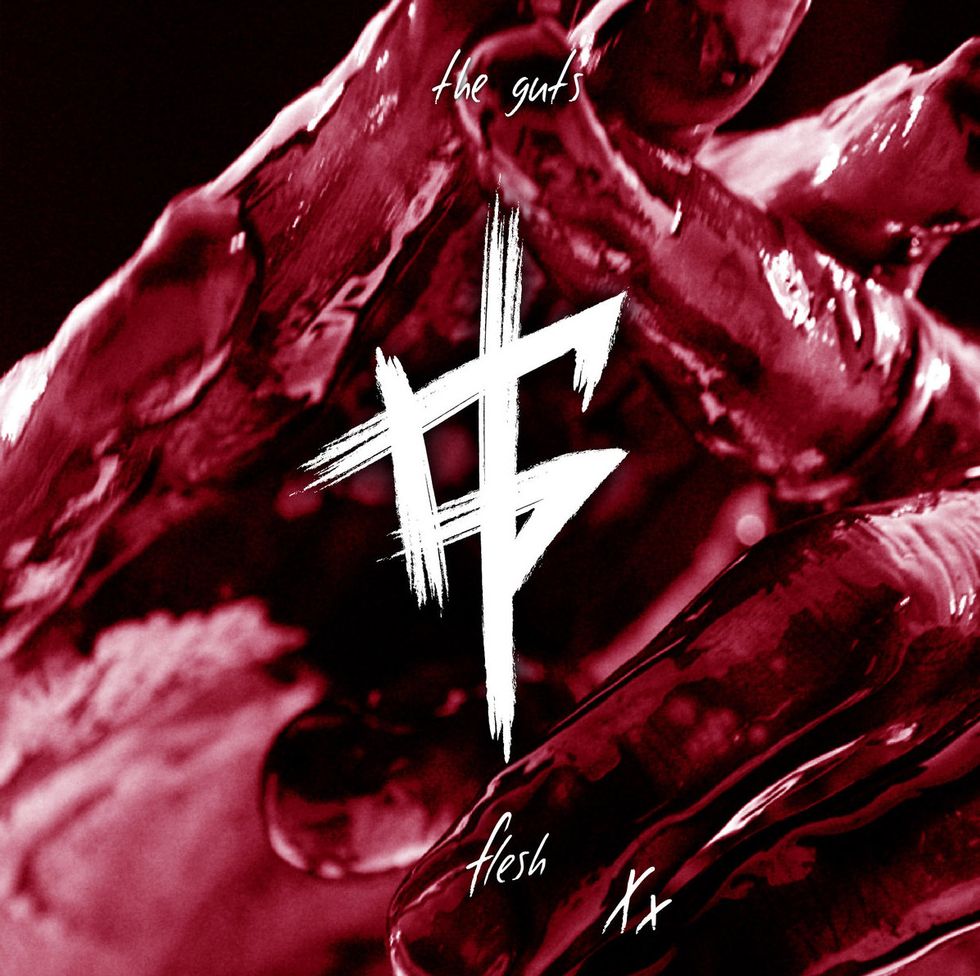
Although the Guts tracked their new album, Flesh, layer-by-layer in the studio, Ben and Dan played their guitar tracks as complete performances for each song, with minimal overdubbing.
The reason I’m asking is because whenever I speak with someone who plays complex, intricate music, I’m curious to learn where that came from—was it organic or were you music school nerds gone bad?
Dan: I think it comes from the drumming. The mathcore genre—the subgenre everyone’s calling math rock these days—is stuff that’s rhythmically interesting. I never wanted to completely drop the idea of drums and it was always way more fun to screw around with rhythms than to become a master shredder or anything like that. It’s always been about rhythm and that attests to the fact that I learned drums first—that was a good skill to take over to guitar.
Ben: As a young person, my influence was about vibe more than figuring out the right guitar parts to play or figuring out where a guitar would work or how to use it. In this really heavy, aggressive music, my love for playing guitar was all about how to use it to create this huge, monstrous, musical vibe, and guitar was my instrumental choice for getting into that. Like Dan, I actually started on drums and guitar playing has always been slightly more of a rhythmic and percussive affair than actually finding the notes, keys, and modes.
Your rhythmic concept isn’t so much about working in odd meters, like doing a jam in 7. Really, it’s rhythmically fluid.
Dan: I think we have short attention spans. We’ll be jamming a section—it might just be 4s, but let’s say it is in 7—but even then, after about four bars we’ll think, “This is getting a bit boring now. We should throw in something else.” As long as it still kind of grooves a bit, we’ll throw in something that makes it fun for us. If we enjoy it, other people will. I think that’s probably where it comes from.
Before switching to his hollowbody Gretsch, Ben Guts was playing a Gibson Midtown Custom, but after breaking its headstock for a second time, he decided, “If I pay to get this fixed again, I’ve almost paid for a new guitar.”
Photo by Ian Coulson/IC Media
Do a lot of your songs start out as jams in rehearsal?
Ben: Yeah. We have the occasional song that is brought to practice, but the huge majority of our songwriting is done in practice with all five of us there. We’ll write a riff that has a vocal line attached to it—something kind of cool, edgy, and aggressive, something that has a real kick to it—and then we’ll spend two to four hours going to the next section. Our sections are never written to offend the section before. We never write sections that are specifically to fuck with whatever came before it. It’s just our progression of going from one section to the other and thinking, “What is going to work here?” It’s like when you’ve got Lego as a kid and you’re smushing the pieces together. You’ve got different bits stuck together and maybe it looks cool in the end.
The contrasts can be very extreme. You’ll go from something rhythmic and intense to something spacious and atmospheric.
Ben: Yeah, because we just find ourselves there. For me, writing music—especially with this group—as a band was always about guiding an atmosphere and creating a piece of artwork that has movements and cool bits in it. When we break into this huge open space, coming from this hectic hurricane of riffs and beats, it’s really, “What can we do that will then turn this into something else?”
That’s a very classical approach to writing. You’re not writing verse/chorus pop songs.
Ben: Escaping from verse/chorus/verse/chorus wasn’t completely intentional. It’s just a natural thing for us. We’re trying to write really fucking crazy, really hectic music, which is going to be an assault on the senses, but also a vibe that one can fuck with a bit but also keep interesting. It’s also important to me that there are always a few sections that are groovy, easy, and that you can bop to.
Dan: Between the Buried and Me sold me that concept very hard. That was a bit of a revelation. Maybe I was 17 or 18 when I first heard them. I thought, “Wow, these songs are more of a journey than a pop hit. I can go back to these and every time I listen it will be the same journey, but I’ll hear something different that will catch me off guard.” So from a young age, I brain-trained myself to hate…. What do they call it? The rondo? I think that’s the musical term for it. I thought, “Why does it have to be like that? Why can’t it be more fun all the time?” Sometimes we have to second-guess ourselves, like, “Is this a song anymore? Do you we need to repeat a section to make it sound like a song?” So we do have that battle. A lot of that also comes from playing the live show. We want to keep people on their toes. A lot of it is geared toward surprising people as much as possible.

Guitars
Gretsch Streamliner
Amps
Marshall JCM2000
Marshall 4x12 cab
Effects
Electro-Harmonix POG2
Boss TU-2 Chromatic Tuner
Line 6 Relay G30 Wireless System
Strings and Picks
D’Addario strings (.010–.046)
Dunlop 1 mm picks
How do you remember so many different sections? Do you practice at home on your own or just review it over and over again at rehearsals?
Dan: A bit of both. The second song we ever wrote took us about two months to write. It’s a track called “Necklace,” which is probably our punchiest one. Depending on how much we’re gigging, it still might take that long to write a song, but sometimes they just come out of the bag in one session. Not very often but sometimes. They’re a labor of love. We did a couple of songs that we had finished, but when it came to recording, we were a bit bored with them so we threw in some more stuff. By the time we’ve learned how it is the first time around, it’s not so hard to remember just a little tweak.
Ben, you were saying you try to make sure some sections groove as well.
Ben: I listen to a lot of beat-down music and I listen to a lot of house—music that one can naturally get the tempo of. It’s usually in 4/4. I like that kind of music because it makes me want to dance. At the same time, being in a mathcore band and writing complex music—I want it to make me move. That feeds into our writing a lot. We’ll write some really crazy sections that are hard to do, but then we’ll wind it back. The whole piece of artwork is important: to round it off and bring it somewhere. I’ve always been an artist before a musician. Not in the sense that I would regard other mediums as more important than music, but writing music for me is about creating something that I just like the idea of, as opposed to expressing myself as a guitarist. Dan is a much more technical player and is someone who’s really got his eye on the ball in terms of guitar. I’m more of an arranger and try to create a whole piece.
Talk about working with another guitar player. How do you distinguish your tones and keep from stepping on each other’s toes?
Dan: We kind of lucked out. Ben loves his dirge and his duuunngg and I really like my noodles and my trebly, high-pitched, standard-tuning, horrible dissonant things. I think it was a bit of a coincidence that we ended up balancing each other nicely. I have this Fender Strat that plays these bite-y chords and Ben has a big hollowbody that does all the lows. They both even each other out. I mean, if we were playing the same guitar in the same way, there really would be no point.
Dan Guts chose a Mexico-made Fender Stratocaster as a sort of anti-metal guitar, after playing a Jackson with a Floyd Rose. Defying expectations is part of the band’s game plan. Photo by Ian Coulson/IC Media
Do you see it as two instruments: guitar A and guitar B?
Dan: Yeah, like Ben said before we started, “Dan’s lead and I’m rhythm.” It’s not exactly that, but that’s the easiest way to describe it. It’s more of a tonal difference. Ben very much plays the lows and I very much play the highs. There’s the occasional showboat riff, but there’s not much shredding and there’s not much lead. It’s all just very percussive.
Ben, I was surprised to see that you play a hollowbody Gretsch. How did that happen?
Ben: My Gretsch Streamliner is fucking cool. I got into hollowbody guitars about five or six years ago, and since I bought my first one, I’ve never bought a solidbody since. I can try to justify it from a guitar player’s perspective, but I like the way they look and I like the vibe that surrounds them. For years, I had a Gibson Midtown Custom and a Gibson Midtown Standard, and those two guitars I absolutely loved. The Gibson Midtown Custom is probably one of the best things I’ve ever owned. It was perfect: It had amazing resonance, it had a huge body, it had a huge, strong sound. It was great at pinches and it sounded really aggressive. I now play a Gretsch Streamliner because I broke the headstock off my Gibson Midtown twice, and upon breaking it the second time, I thought, “If I pay to get this fixed again, I’ve almost paid for a new guitar.” So I bought a new guitar, which is the Gretsch Streamliner.
I like to make.” —Dan Guts
Yeah, you shine a torch [Editor’s note: That’s “flashlight” in America] through one end it shines right out. I can throw that thing around and I can slam the hell out of it and it’s just so easy to handle because it’s so light.
How do you keep feedback under control?
Ben: We don’t. When the guitars are squealing and it’s too much noise, I like that. I try to write that into our music and I try to make it part of the attitude of the music. The guy that sold me the Gretsch, I told him what I was going to play on it and he said, “Dude, you realize this is just going to scream at you the whole time?” I said, “Yeah, sign me up. Let’s do it.” I like the feedback. I don't use the neck pickup on the Gretsch, so I have that one turned down. If I really need to kill the guitar and I’m away from my tuning pedal, I just flip the switch. Generally speaking, the feedback is part of our live show. On that note, our first EP was recorded with some friends who have a home studio, and me and Dan did our guitar takes, got them straight, and then I sat down with the producer and recorded loads of different feedback and guitar scratching.

Guitars
Mexico-made Fender Stratocaster
Amps
Blackstar Series One 100-watt head
Marshall ATV150H head
Blackstar 4x12 cab
Effects
Electro-Harmonix POG2
Boss TU-2 Chromatic Tuner
Line 6 Relay G50 Wireless System
Strings and Picks
Ernie Ball Super Slinky strings (.009–.042)
Dunlop 0.6 mm picks
You inserted that after the fact?
Ben: Yeah, to get the tone right in the studio. The feedback wasn’t really there and I said to the producer, “I really want it to squeal when the guitars are playing.” We went back and recorded squealing. I coproduced it with him and put in squeals where they would fit.
Do you record live with everyone in the same room?
Dan: None of it is done live. We track everything. But with Flesh, the one we just released, everything was one take. Our producer said, “We want it to sound live and we want it to sound heavy, so we’re going to do everything in one take”—which is a bit daunting. We did three or four takes, picked the best from start to finish, and didn’t overdub anything except for bites [short individual sections].
Do you get your distortion from the amp, or do you use a pedal?
Dan: From the amp. I’ve steered away from the world of pedals. In my old band, I used a lot of pedals and I was tap dancing a lot on them, but our live show is me and Ben playing in the pit in front. We don’t really ever play onstage, so to have our pedals down there or far away is ridiculous if we have to use them. We both have an Electro-Harmonix POG2, which I have on all gig and all practice. I have a bit of each octave slightly lower—whatever distortion you have on, it’s just amplified by the addition of those octaves.
Ben: I use the Marshall JCM2000 and I use the distortion on the amp. I have an Electro-Harmonix POG, but mine’s not on all the time. I just use the POG to make it really dirty. The JCM2000 is wonderful. It’s really strong, it’s really beefy, it has serious body. That’s how I play a full-on hollowbody Gretsch and still make it wo… because of that amp.
Intense, chaotic, and riveting, the Guts blast through “Slipped Disco” from their recent album Flesh. And yeah, they’re smashing the fourth wall big time.




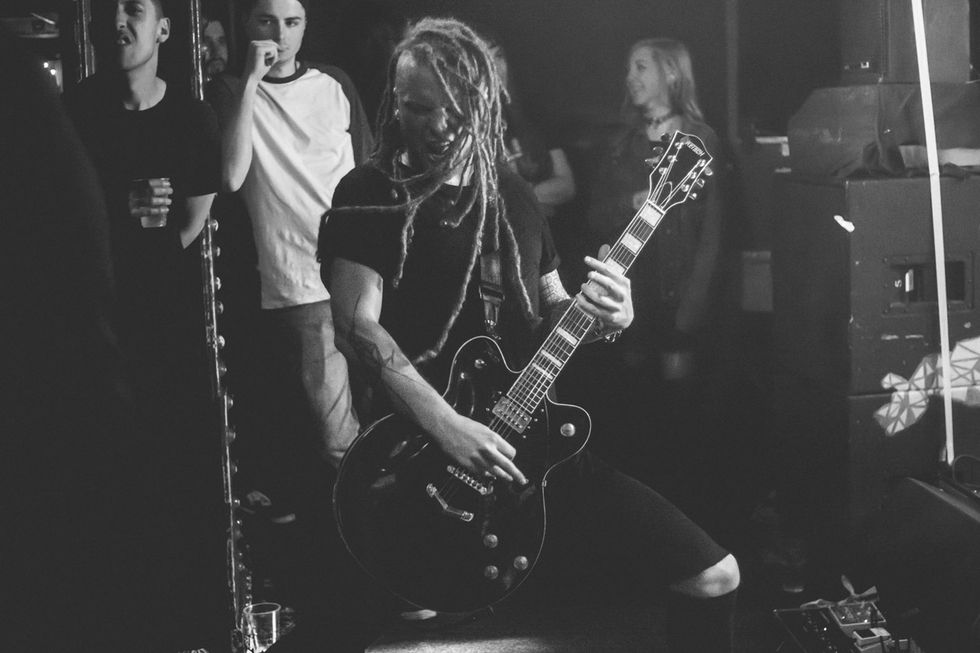
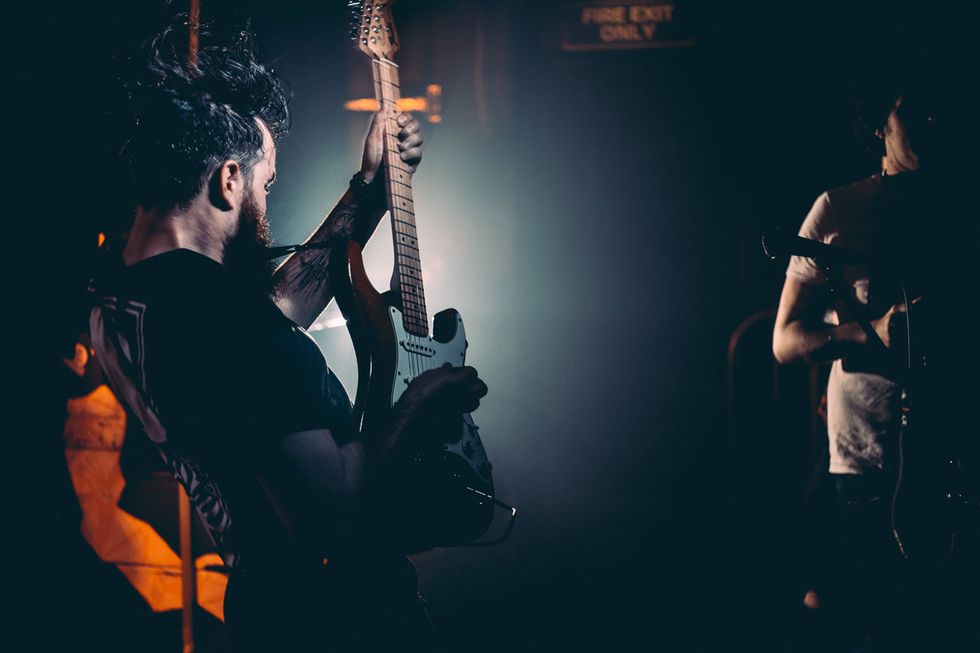





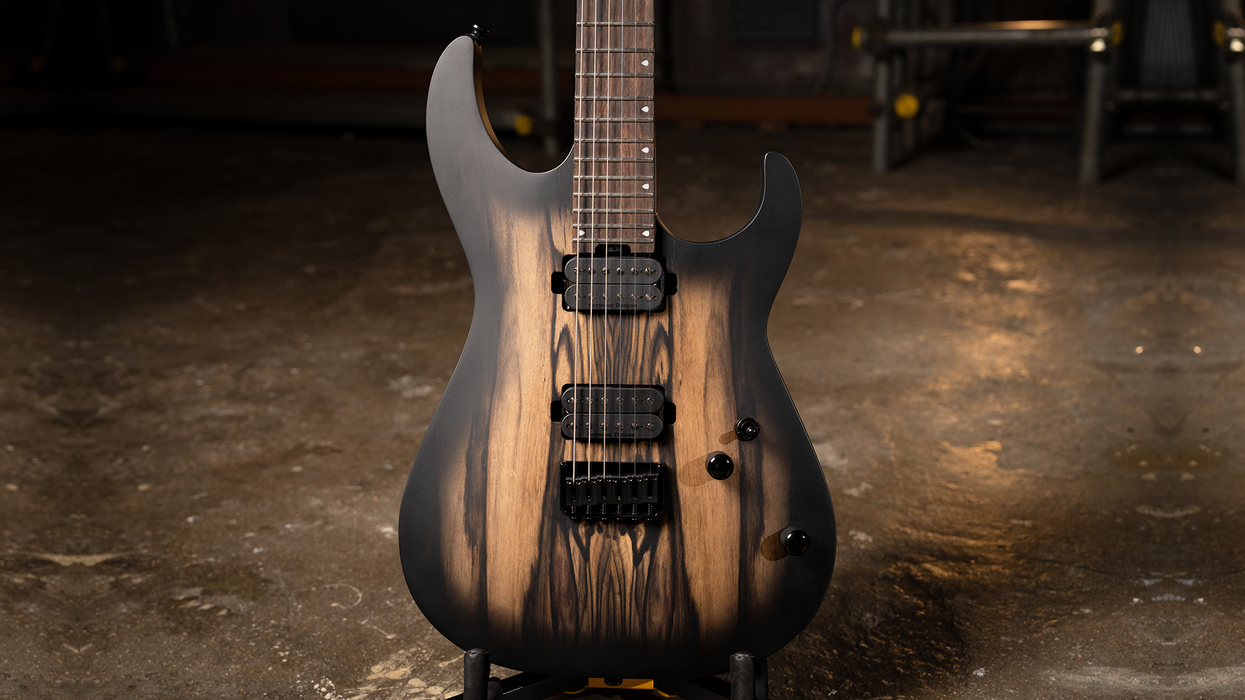

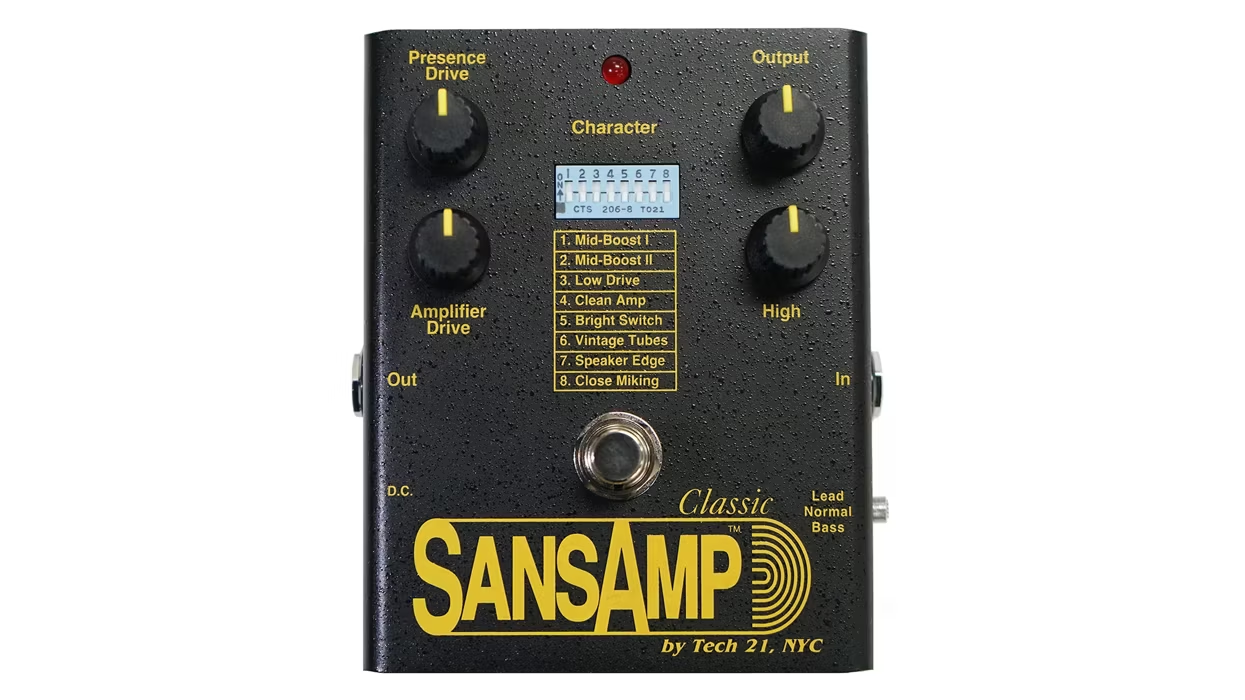
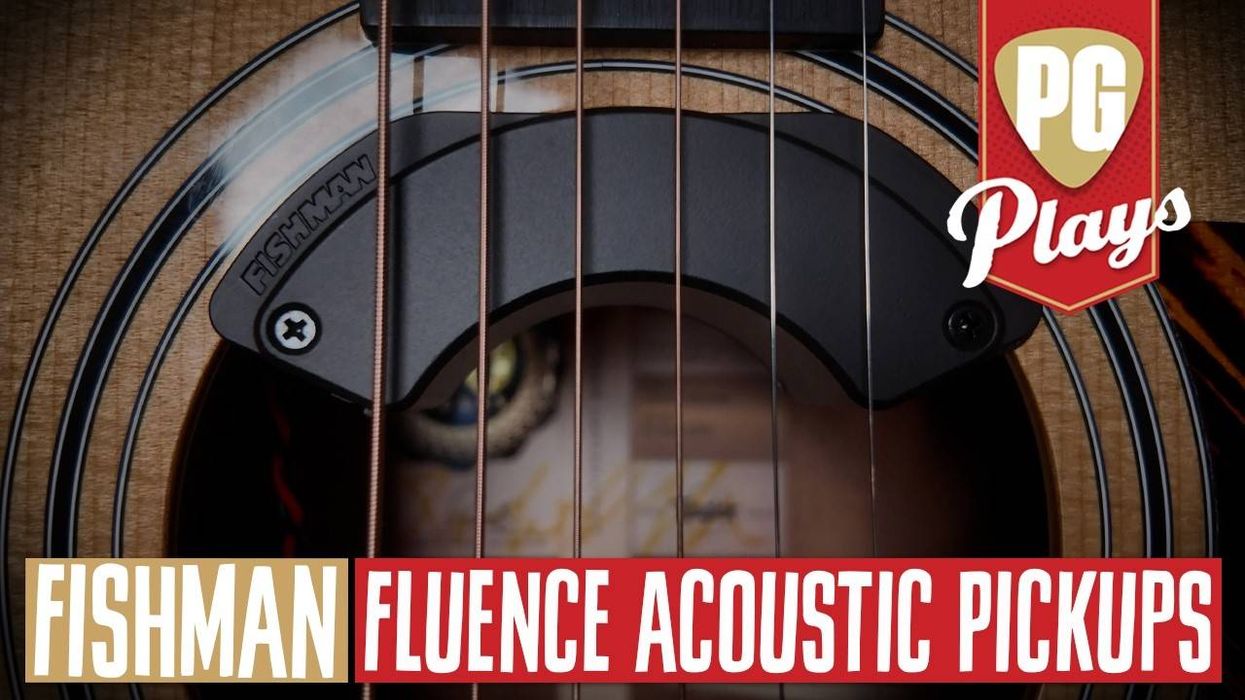
![Rig Rundown: Russian Circles’ Mike Sullivan [2025]](https://www.premierguitar.com/media-library/youtube.jpg?id=62303631&width=1245&height=700&quality=70&coordinates=0%2C0%2C0%2C0)
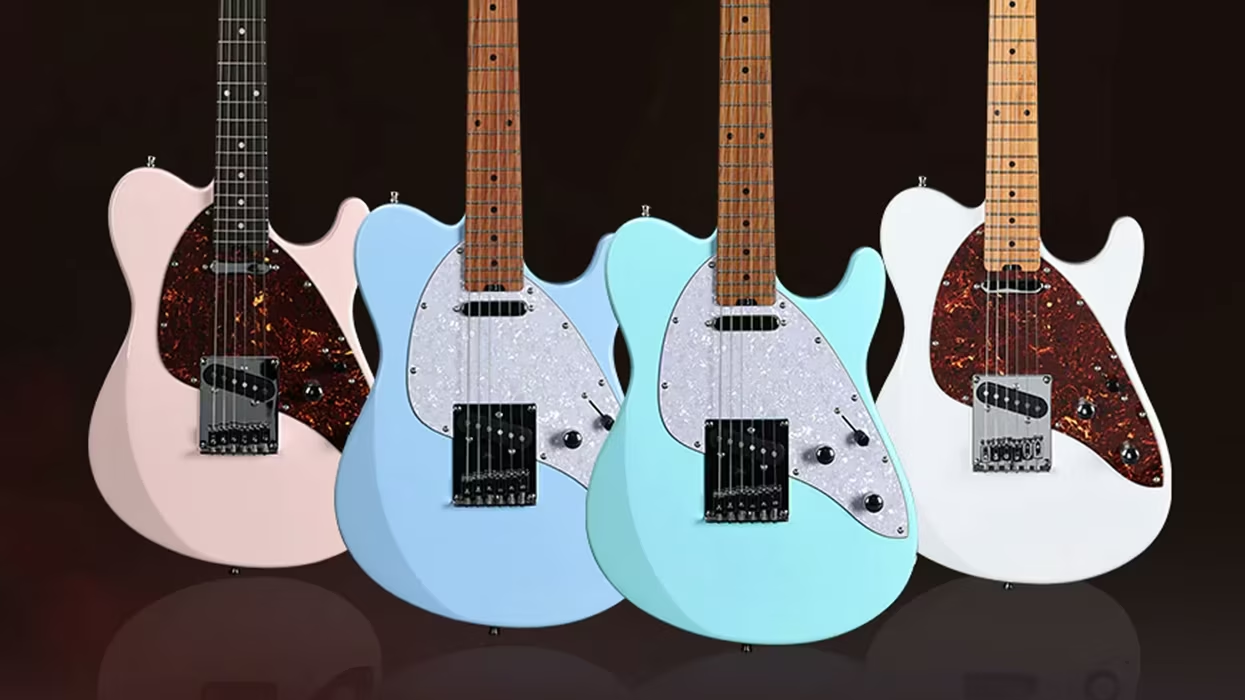










![Rig Rundown: AFI [2025]](https://www.premierguitar.com/media-library/youtube.jpg?id=62064741&width=1245&height=700&quality=70&coordinates=0%2C0%2C0%2C0)




















 Zach loves his Sovtek Mig 60 head, which he plays through a cab he built himself at a pipe-organ shop in Denver. Every glue joint is lined with thin leather for maximum air tightness, and it’s stocked with Celestion G12M Greenback speakers.
Zach loves his Sovtek Mig 60 head, which he plays through a cab he built himself at a pipe-organ shop in Denver. Every glue joint is lined with thin leather for maximum air tightness, and it’s stocked with Celestion G12M Greenback speakers.











